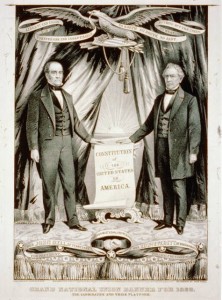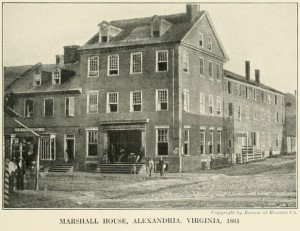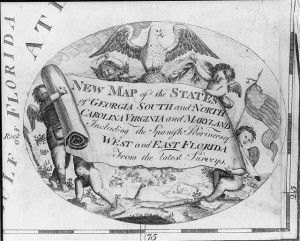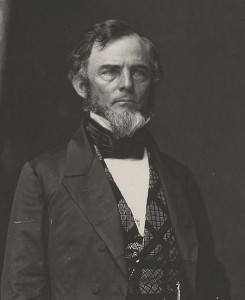Four quick takes – all from the June 9, 1861 edition of The New-York Times:
1. The Times castigates the 1860 nominee of the Constitutional Union Party for not supporting said Union:
During the Presidential campaign of last Fall, were presented to the American people, as candidates for the two highest offices in their gift, the names of JOHN BELL, of Tennessee, and EDWARD EVERETT, of Massachusetts. These candidates, it was claimed, should be supported, irrespective of party organizations, as the peculiar friends and upholders of the Union as it is. Their banner was the Stars and Stripes simply, and around it were invited to rally all who loved their country, all who regarded this great Republic, reaching from ocean to ocean, and from the lakes to the gulf, as a solid indivisible whole, who were against the madness of Southern secession, and what they were pleased to term the sectionalism of the North; who were willing to cut loose from the corruptions of old political organizations on the hunt for spoils, and of forming anew into one great political brotherhood, of which JOHN BELL was to be the head, and whose watchword was the Union, in its integrity, against all assailants from whatever quarter. …
We know where his deceived and betrayed followers are to be found. We know the patriotic position of his associate in the canvass, and we know the position of the young and generous hearts, the conservative thousands who stood, as they supposed, between the Pro-Slavery fanaticism of the South and the Anti-Slavery fanaticism of the North, sacrificing all political affinities and party associations for what they regarded as their country’sgood. Some are among the loyal forces with arms in their hands, defending with their lives the Union they professed to love, proving the sincerity of their devotion by the peril they are ready to encounter for its salvation. Others are aiding by their eloquence, their influence and their money the cause of their country, and all are busy in its defence; but where is JOHN BELL? …
Wikipedia found him:
Initially opposed to secession, he travelled to Washington, D.C. to meet with President Lincoln. Bell was initially successful in helping hold Tennessee in the Union after states in the Deep South seceded. However, after the secessionist firing on Fort Sumter in South Carolina and Lincoln’s call up of troops in response to this attack, Bell reluctantly accepted Tennessee’s subsequent secession and retired from politics, his spirit broken and in ill health. He joined a group of investors in saltworks and ironworks, purchasing a shared interest in the Cumberland Furnace near Charlotte, Tennessee. However, most of his businesses were severely damaged or ruined during the Civil War.
Like General Lee and others he appears to have accepted his state’s decision.
2) New Orleans appreciates James W. Jackson, the slayer of Elmer Ellsworth:
Dr. GEO. W. CARTER writes to the New-Orleans Delta:
“I knew Mr. JACKSON personally, and was a guest at his hotel only a few days since. In killing ELLSWORTH he only executed a purpose previously formed, to wit: to defend with his life the flag which floated over his house.
When I expressed a fear lest his flag might be taken down by the Federal forces who soon proposed to occupy Alexandria, he very quietly replied that it should never come down while he lived, and that he would kill the man who attempted it, though he was backed by all the Black Republicans in Washington.
JACKSON was a generous, fearless man, and deserves a monument. His widow and four children are in necessitous circumstances, and the fund proposed will not only be timely, but worthily bestowed. I hope the citizens of New-Orleans will come forward with their accustomed liberality. It may be well to add that Mr. MOORE, who was originally from the neighborhood of Alexandria, and knew Mr. JACKSON and his friends, is in all respects the person to undertake the matter.”
The Delta adds:
“We learn that the subscriptions for the family of JACKSON, the slayer of ELLSWORTH, proceeds very briskly. One gentleman yesterday collected $150 from a few friends. Those liberal and generous gentlemen, MORSE & MOORE, of the City Hotel, have opened lists at their hotels, the City and St. James’ Hotel. It is hoped that all who can spare a dime or a dollar will contribute to this noble object.
We heard yesterday that a wealthy and liberal merchant of this city, who left for Virginia in the same train with the Washington Artillery, stated that one of his objects was to take charge of the family of JACKSON, and see that they were comfortably provided for, and in case they consented, to bring them to Louisiana, and secure them in comfort for the rest of their lives.
3. The fire-eating Charleston Mercury as prudently warning?
From the Charleston Mercury, May 31.
Night and day, for the last two months, has the Northern Government been making herculean efforts in its Department of War. Preparation on the most gigantic scale has gone on steadily and unflagging under the intelligent and able superintendence and direction of Gen. SCOTT. An immense body of volunteers have been thrown into camp, and are drilling eight hours a day under competent officers of West Point training. …
In all this the military proceedings of the North, since the fall of Sumter, have been eminently wise. For the purpose of overpowering, disheartening and gaining the first advantages, which, both at home and abroad, are of immense importance, the concentration of all the forces available as promptly as possible, has been clearly the course of generalship and true economy. The first blow is said to be often half the battle. The war policy of SCOTT and the Northern Government has all the effect of the first blow. The final result we cannot, in the slightest degree, doubt. The immediate signal will depend, in a great measure, upon the number of troops now got ready, and the efficiency of the preparation made for them by the Confederate Government during the same period SCOTT has been at work. Let us not commit the mistake of underrating our enemy, or of supposing that, in modern warfare, it is only the courage of a people and the relative military talent of their field officers that decide the issues of war. Ability in combinations and bravery in executing them, may fail of success where the material is wanting or deficient. An hour’s delay of a corps of reserve lost the battle of Waterloo; and NAPOLEON fought the battle with the best troops in the world. They were cut to pieces.”
4. The furtive P.G.T. Beauregard sure has been in the news a lot lately:
THE REBELS ARREST BEAUREGARD AS A SPY.
The Louisville Journal says:
“A gentleman from Memphis informs us that Gen. BEAUREGARD arrived there a few days since, and used great endeavors to keep his movements secret. Being a stranger, and somewhat observant, he attracted the attention of the Vigilance Committee, who arrested him as a spy and suspected person. The generalissimo of the Confederate forces had to send for Gen. PILLOW to identify him, and the hero of Camargo soon convinced the Vigilants that they had dug their ditch on the wrong side of the rampant of Memphian defence, whereupon BEAUREGARD was discharged with apologies.”




